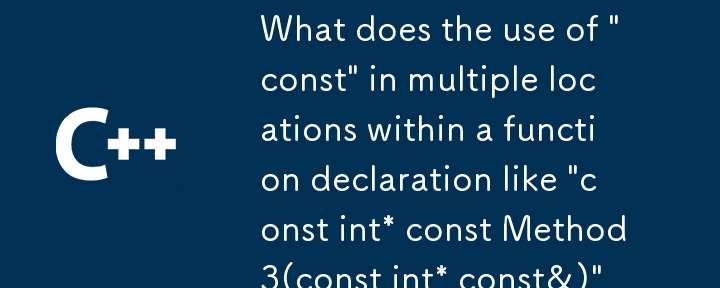Home >Backend Development >C++ >What does the use of \'const\' in multiple locations within a function declaration like \'const int* const Method3(const int* const&)\' signify?
What does the use of \'const\' in multiple locations within a function declaration like \'const int* const Method3(const int* const&)\' signify?
- Linda HamiltonOriginal
- 2024-11-03 12:06:02387browse

Understanding the Usage of "const" in Function Declarations
In programming, the keyword "const" is frequently used in function declarations to specify immutability. This article delves into the significance of "const" in different contexts.
In the provided function declaration:
<code class="cpp">const int* const Method3(const int* const&);</code>
"const" occurs multiple times, indicating that various elements of the function's signature are immutable. Let's break it down:
1. "const" in Return Types:
Here, "const" designates that the method will return a pointer to a constant integer. This means that the caller cannot modify the value pointed to by the returned pointer.
2. "const" in Function Parameters:
"const" before the parameter specifies that the parameter is a reference to a constant pointer to a constant integer. The reference itself cannot be changed, implying that the function cannot assign it to a different pointer. Furthermore, the pointer it refers to cannot be reassigned to point to a different integer.
3. "const" after Member Functions:
"const" after the function name is commonly applied to member functions (in this case, Method3). It indicates that the function cannot modify the object on which it is called. This means that the function cannot change any of the object's member variables.
In summary, the function Method3 is a const member function that takes a reference to a const pointer to a const integer as its argument. It returns a const pointer to a const integer. This signifies that the function will not modify the original object, the pointer it receives, or the integer it points to.
The above is the detailed content of What does the use of \'const\' in multiple locations within a function declaration like \'const int* const Method3(const int* const&)\' signify?. For more information, please follow other related articles on the PHP Chinese website!
Related articles
See more- C++ compilation error: A header file is referenced multiple times, how to solve it?
- C++ compilation error: wrong function parameters, how to fix it?
- C++ error: The constructor must be declared in the public area, how to deal with it?
- Process management and thread synchronization in C++
- How to deal with data splitting problems in C++ development

